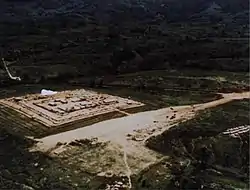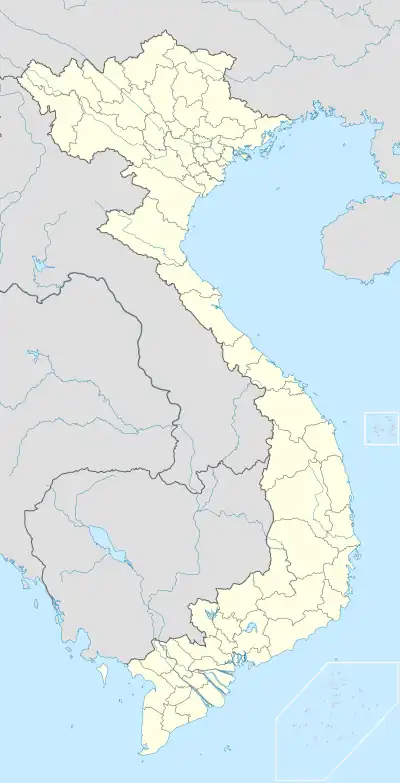| Dak Seang Camp (Dak Seang Airfield)   | |||||||
|---|---|---|---|---|---|---|---|
| Kon Tum, Central Highlands in Vietnam | |||||||
 Dak Seang Camp, 19 July 1968 | |||||||
 Dak Seang Camp Shown within Vietnam | |||||||
| Coordinates | 14°49′34″N 107°41′10″E / 14.826°N 107.686°E | ||||||
| Type | Army Base | ||||||
| Site information | |||||||
| Operator | Army of the Republic of Vietnam (ARVN) United States Army (U.S. Army) | ||||||
| Condition | Abandoned | ||||||
| Site history | |||||||
| Built | 1964 | ||||||
| In use | 1964-1972 | ||||||
| Battles/wars | Vietnam War Battle of Dak To | ||||||
| Garrison information | |||||||
| Garrison | 5th Special Forces Group | ||||||
| Airfield information | |||||||
| Elevation | 2,156 feet (657 m) AMSL | ||||||
| |||||||
Dak Seang Camp (also known as Dak Seang Special Forces Camp) is a former US Army and Army of the Republic of Vietnam (ARVN) base northwest of Kon Tum in the Central Highlands of Vietnam.
History

The 5th Special Forces Group and CIDG forces [1] first established a base at here in 1964 to monitor communist infiltration along the Ho Chi Minh Trail. The base was located 10 km from the Laotian border, 23 km northwest of Đắk Tô and approximately 64 km northwest of Kon Tum.[2]
5th Special Forces Detachment A-245 was based here in October 1966.[1]: 248
On 18 August 1968 the People's Army of Vietnam (PAVN) 101D Regiment, supported by artillery attacked the camp. The attack was beaten back with small arms and artillery fire.
On 1 April 1970 the PAVN attacked the camp starting a siege that lasted until 8 May. At the same time the PAVN attacked the Dak Pek Camp. On 15 April 1970 the 170th Assault Helicopter Company dropped the 3rd Battalion, 42nd ARVN Regiment into a landing zone near Dak Seang, resulting in the loss of two helicopters.[3] Sergeant Gary B. Beikirch a 5th Special Forces Group medic would be awarded the Medal of Honor for his actions during the siege. SFC Gary L. Littrell would be awarded the Medal of Honor for his actions during the siege as an advisor to the ARVN 23rd Battalion, 2nd Ranger Group.
On 29 October 1972, following a 1,000+ round artillery barrage, the PAVN attacked the camp forcing its 300 Ranger defenders to abandon it by nightfall.[4]
Shootdowns
- 2 April 1970: de Havilland Canada C-7A Caribou #61-2406 was shot down while dropping supplies, killing all three crew[5]
- 4 April 1970: C-7B Caribou #62-4180 was shot down while dropping supplies, killing all three crew[6]
- 6 April 1970: C-7B Caribou #63-9746 was shot down while dropping supplies, killing all three crew[7]
- 15 April 1970: Bell UH-1H Huey #68-16203 was shot down while landing ARVN troops, resulting in two US and two ARVN killed
- 15 April 1970: Sikorsky HH-3E Jolly Green Giant #66-13280 of the 37th Aerospace Rescue and Recovery Squadron was shot down while trying to rescue the crew of UH-1H #68-16203, resulting in one crewman killed
Current use
The base has been turned over to forest and housing adjacent to the Ho Chi Minh Highway.
References
- 1 2 Stanton, Shelby (2003). Vietnam Order of Battle. Stackpole Books. p. 246. ISBN 978-0-8117-0071-9.
- ↑ Kelley, Michael (2002). Where we were in Vietnam. Hellgate Press. p. 5-133. ISBN 978-1-55571-625-7.
- ↑ "Rosendo Montana SP5". The Virtual Wall. Archived from the original on 6 March 2016. Retrieved 25 November 2014.
- ↑ Craig Whitney (31 October 1972). "Communists seize camp in Highlands". The New York Times. p. 1.
- ↑ "de Havilland Canada C-7A Caribou 61-2406". Aviation Safety Network. Retrieved 25 November 2014.
- ↑ "de Havilland Canada C-7B Caribou 62-4180". Aviation Safety Network. Retrieved 25 November 2014.
- ↑ "de Havilland Canada C-7B Caribou 63-9746". Aviation Safety Network. Retrieved 25 November 2014.